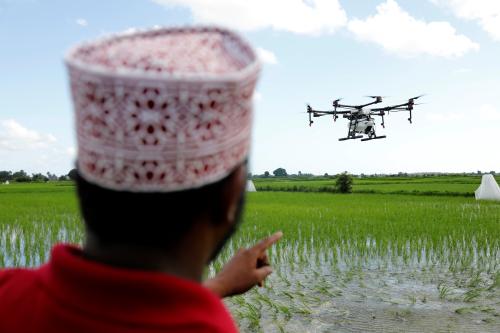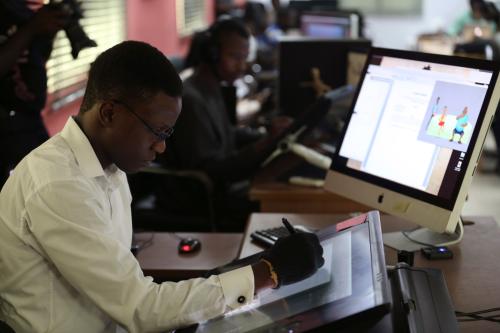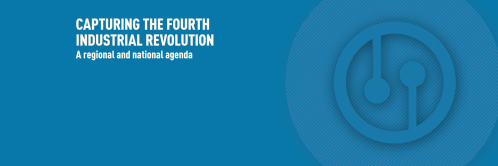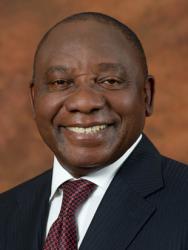Below is a Viewpoint from Chapter 5 of the Foresight Africa 2020 report, which explores six overarching themes that provide opportunities for Africa to overcome its obstacles and spur inclusive growth. Read the full chapter on capturing the Fourth Industrial Revolution.
The Fourth Industrial Revolution (4IR) represents the great tectonic shift of our time. It is creating new possibilities for improving people’s lives. Disruptive technologies like machine learning, artificial intelligence, and big data are changing the way we live, the way we work and do business, and the way we govern.
As a continent that continues to be impacted by historically low levels of development, Africa can and must take advantage of technological advances to industrialize, pursue inclusive growth, and attract investment. It must also be at the forefront of driving new solutions to our developmental challenges, like access to health care and education.
South Africa is preparing itself to take the great quantum leap into the future, and in doing so to ensure that technological advances benefit all, and not a select few.
By 2030, we aim to be a nation that has fully harnessed the potential of technological innovation to grow our economy and to uplift our people. To this end, we have established a Presidential Commission on the Fourth Industrial Revolution to develop an integrated national response strategy. The commission is composed of representatives of tech startups, academia, cybersecurity specialists, researchers, social scientists, trade unionists, and other representatives from key economic sectors. This commission, which is due to report in early 2020, has various workstreams on issues such as infrastructure and resources, research, technology and innovation, human capital, industrialization, and policy and legislation.
Our focus is threefold. First, we need to respond with agility and purpose. Like the self-learning artificial intelligence we have today that was unthinkable a decade ago, we must be adaptive and responsive to the pace of change.
We want to be a country where our people are digital citizens, our workforce is skilled and empowered, and our youth enjoy the transformative benefits of employment in a new world of work.
Second, we are determined to take advantage of the opportunities technological change presents to enhance our global competitiveness, with a focus on key sectors with high growth potential such as agriculture, mining, manufacturing, information and communications technologies, and electronics. That is why we have prioritized attracting investment in ICT infrastructure, especially fiber optics. We also are in the process of licensing high-demand broadband spectrum as part of our economic reform package. Next generation super-fast 5G is already being rolled out in parts of South Africa.
South Africa is also developing capabilities to further our scientific and technological understanding. Projects like the MeerKat radio telescope are pushing the envelope of space observations. Our Council for Scientific and Industrial Research is recognized as a continental leader in research into complex contemporary challenges from climate change early warning systems, to water security, to biotech and nuclear research.
Third, we aim to ensure that our citizens are prepared, and, where necessary, to shield them from any adverse consequences of technological change. Just about every industry will be impacted by automation. Reskilling will therefore be critical, as will investing heavily in curriculum innovation to prepare our people for the jobs of the future.
By 2030 we want to be fully integrated into the economy of the future—an economy that uses technological innovation to revolutionize manufacturing and industrial processes and energy provision and distribution. We want to demonstrate how science, technology, and innovation have been used to enhance our food and water security and to build smart human settlements.
We want to be a country where our people are digital citizens, our workforce is skilled and empowered, and our youth enjoy the transformative benefits of employment in a new world of work. Africa is a continent of entrepreneurs, and we want to use the advance of technology to catalyze entrepreneurial activity. Economic growth will be driven by the leaner and more adaptable small- and medium-sized businesses of the future. Industry 4.0 will enable us to “leapfrog” outdated processes and technologies in favor of newer, more sustainable ones. Digital business models such as mobile money have taken root in large continental markets and are expanding.
Although the resource sector will continue its substantial contribution to GDP, Africa’s long-term growth lies in scaled-up investment in disruptive technologies, especially with the rapid growth of the consumer class, more people entering the workforce, improved levels of education, and mass urbanization.
Our ability to harness the 4IR rests on forging collaborative partnerships between government and the private sector, with policymakers and industry experts, and with our fellow nations on the African continent. Our success rests on the political will of governments, on being prepared to take risks, and on striking a balance between innovation and regulation.
South Africa, together with the other nations of the world, shares a desire to be part of this new age of disruption, and, in doing so, ensures that we move beyond mere connectivity towards sustainable growth, tangible job creation, and an inclusive future.
The Brookings Institution is committed to quality, independence, and impact.
We are supported by a diverse array of funders. In line with our values and policies, each Brookings publication represents the sole views of its author(s).









Commentary
A national strategy for harnessing the Fourth Industrial Revolution: The case of South Africa
January 10, 2020